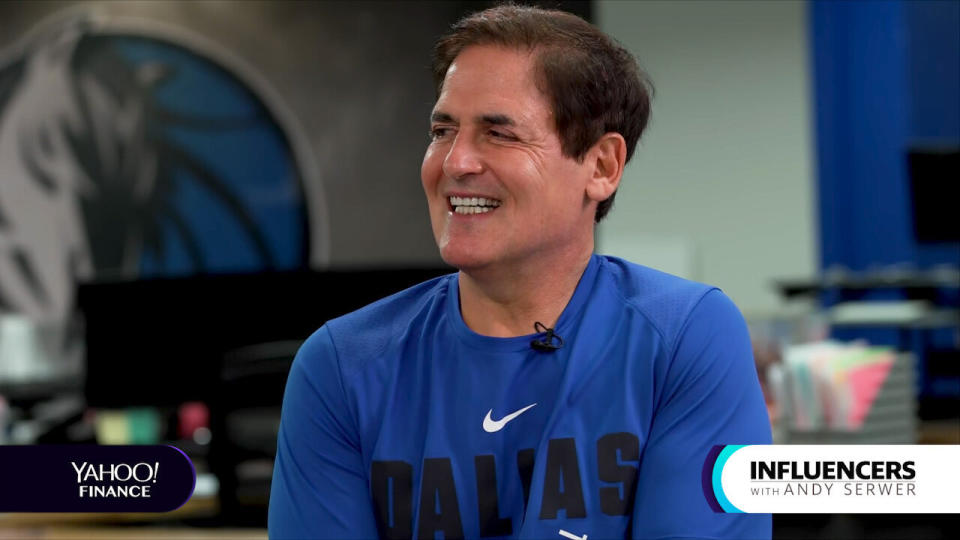Facebook and Google are America’s ‘biggest competitive advantage,' says Mark Cuban
In a new interview, Dallas Mavericks owner Mark Cuban rejected calls to break up tech companies like Google (GOOG, GOOGL) and Facebook (FB), saying the internet giants constitute America’s “biggest competitive advantage” over China and Russia.
“If you were to break up any of those companies,” Cuban says. “We're going to lose our greatest competitive advantage that we have versus the Chinese and the Russians in a space that we need to dominate.”
Cuban, a billionaire entrepreneur and host of the television show “Shark Tank,” said the Chinese and Russian governments understand the significance especially of artificial intelligence, pointing to national plans on the subject underway or under development in the two countries.
“In the United States, we don't have those plans yet,” he says. “But what we do have is five to 10 really, really big tech companies who dominate the research and development in the AI space.”
Cybersecurity and tech innovation have become a central point of contention in the trade war between the U.S. and China. Last week, Trump declared a national emergency over threats to the U.S. posed by foreign tech companies, a move many perceived as a blow to Chinese telecommunications equipment company Huawei.
Trump is reportedly considering imposing limits on the Chinese tech firm Hikvison, which produces surveillance technology used by the Chinese government to track members of the country’s Uighur minority, about 1 million of whom have been detained in internment camps.
The spirited defense of big tech aired by Cuban, who is mulling a 2020 presidential run, distinguishes him from many Democratic presidential candidates who have called for the breakup of companies like Google and Facebook.
In March, Senator Elizabeth Warren called for the breakup of major tech companies. She argued that rather than promote innovation, they stifle it. “Weak antitrust enforcement has led to a dramatic reduction in competition and innovation in the tech sector,” she wrote on Medium.
Sen. Bernie Sanders (I-VT) and Rep. Tulsi Gabbard (D-HI) have since backed Warren’s proposal. Former vice president Joe Biden and Sen. Kamala Harris (D-CA) have both said the break-up of big tech is worth considering.
Cuban made the remarks to Editor-in-Chief Andy Serwer in a conversation that airs on Yahoo Finance on Thursday in an episode of “Influencers with Andy Serwer,” a weekly interview series with leaders in business, politics, and entertainment.
While Cuban is known for the Mavericks and “Shark Tank,” he made his first billions with an online streaming company called AudioNet that he co-founded in 1995. The company, which later became broadcast.com, sold to Yahoo in 1999 for stock valued at $5.7 billion. Soon after, in 2000, Cuban purchased the NBA’s Dallas Mavericks for $285 million; the team is now valued at $2.3 billion, according to Forbes. He also co-founded 2929 Entertainment, a film production and distribution company.
Cuban has invested in hundreds of start-ups as a host of the TV show “Shark Tank,” which he joined in 2012.

‘You don’t have to use Facebook. You don’t have to use Amazon.’
Expanding upon his support for big tech, Cuban argued that antitrust action is unnecessary because consumers can go elsewhere for similar products.
“It’s not like there aren’t alternatives,” he says. “You don’t have to use Facebook. You don’t have to use Amazon.”
Cuban contrasted the market share of the big tech companies today with that of AT&T in 1982, when the company was broken up as a result of a federal antitrust lawsuit.
“I don't see them as utilities like the phone where the only way you could use a phone was to go through AT&T back in the ‘80s,” he says.
Legal authorities and antitrust watch dogs may disagree. Last Monday, the U.S. Supreme Court let proceed a case brought against Apple by four iPhone consumers who argued that the 30% commission charged to app developers for use of the company’s app store often gets passed on to users.
Last July, the European Commission fined Google €4.3 billion for efforts to push smartphone makers to pre-install apps for its Android operating system. The German competition authority, called the Bundeskartellamt, in February placed restrictions on Facebook after finding the company used its market dominance to abuse access to users’ data.
Andy Serwer is editor-in-chief of Yahoo Finance.
Read more:
Blackstone CEO Steve Schwarzman: 'China is not as soft as you think'
Pete Buttigieg 'is a terrific candidate,' says longtime Obama adviser Valerie Jarrett
Charlie Munger: Trump is not primarily responsible for US economic success
Follow Yahoo Finance on Twitter, Facebook, Instagram, Flipboard, SmartNews, LinkedIn,YouTube, and reddit.

 Yahoo Finance
Yahoo Finance 